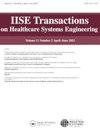在患有多种慢性疾病(合并症)的患者中获取和使用移动医疗(mHealth)进行通信、健康监测和决策
IF 1.5
Q3 HEALTH CARE SCIENCES & SERVICES
IISE Transactions on Healthcare Systems Engineering
Pub Date : 2023-10-10
DOI:10.1080/24725579.2023.2267085
引用次数: 0
摘要
摘要多种并存的慢性疾病影响患者管理自身健康状况的能力。移动医疗为持续获得和提高医疗质量提供了机会。本研究探讨了移动医疗的获取及其在合并症患者中的使用。基于社会认知理论(SCT),本研究还探讨了环境因素(护理质量和拥有定期提供者)和个人因素(自我效能感和健康状况感知)如何影响合并症患者的行为因素(使用移动健康进行沟通、健康监测和决策)。多元逻辑回归模型使用卫生信息国家趋势调查数据(2020-2021年)。该研究包括9303名参与者,其中3260名患有合并症。这些假设在患有合并症的人身上进行了测试,这些人为了健康目的而使用移动医疗。使用移动医疗监测健康相关问题与合并症显著相关。拥有固定的医疗服务提供者会影响使用移动医疗进行健康监测、沟通和决策的决定。合并症患者的自我效能感影响他们使用移动医疗进行健康监测和决策。最后,良好的健康状况感知会影响移动健康监测的使用。尽管不同的因素影响不同的行为,但研究结果支持了社会认知理论的假设,即将人的行为与他们的感知和环境因素联系起来。这些发现扩展了支持社会认知理论在医疗保健应用中的有效性的文献,并深入了解了移动医疗在支持合并症患者护理方面的重要性。关键词:慢性疾病,合并症,健康沟通,决策,获得护理,消费者健康信息,护理质量免责声明作为对作者和研究人员的服务,我们提供此版本的已接受稿件(AM)。在最终出版版本记录(VoR)之前,将对该手稿进行编辑、排版和审查。在制作和印前,可能会发现可能影响内容的错误,所有适用于期刊的法律免责声明也与这些版本有关。作者报告说,没有与本文所述工作相关的资金。本文章由计算机程序翻译,如有差异,请以英文原文为准。
Access and Usage of mobile health (mHealth) for communication, health monitoring, and decision-making among patients with multiple chronic diseases (comorbidities)
AbstractMultiple co-existing chronic diseases impact patients' ability to manage their medical conditions. MHealth provides opportunities for continuous access to and better quality of care. This study explored access to mHealth and its Usage among people with comorbidities. Based on Social Cognitive Theory (SCT), this study also explores how environmental factors (quality of care and having a regular provider) and personal factors (self-efficacy and perception of health status) can impact behavioral factors (mHealth use for communication, health monitoring, and decision-making) of people with comorbidities. Multivariate logistic regression models use Health Information National Trends Survey data (2020-2021). The study included 9303 participants, and 3260 of them had comorbidities. The hypotheses are tested on people with comorbidities who used mHealth for health purposes.The use of mHealth to monitor health-related issues was significantly correlated with comorbidity. Having a regular provider impacts the decision to use mHealth for health monitoring, communication, and decision-making. Self-efficacy perception of patients with comorbidities impacts their use of mHealth for health monitoring and decision-making. Finally, a good perception of health status impacts the use of mHealth for health monitoring. Even though different factors impact different behaviors, the findings support the hypotheses of the social cognitive theory linking the person's behavior to their perceptions and environmental factors. These findings extend the literature supporting the validity of the social cognitive theory in healthcare applications and give insights into the importance of mHealth in supporting care for patients with comorbidities.Key Words: Chronic diseasesComorbiditymhealthCommunicationDecision makingAccess to careConsumer health informaticsQuality of CareDisclaimerAs a service to authors and researchers we are providing this version of an accepted manuscript (AM). Copyediting, typesetting, and review of the resulting proofs will be undertaken on this manuscript before final publication of the Version of Record (VoR). During production and pre-press, errors may be discovered which could affect the content, and all legal disclaimers that apply to the journal relate to these versions also. FundingThe author(s) reported there is no funding associated with the work featured in this article.
求助全文
通过发布文献求助,成功后即可免费获取论文全文。
去求助
来源期刊

IISE Transactions on Healthcare Systems Engineering
Social Sciences-Safety Research
CiteScore
3.10
自引率
0.00%
发文量
19
期刊介绍:
IISE Transactions on Healthcare Systems Engineering aims to foster the healthcare systems community by publishing high quality papers that have a strong methodological focus and direct applicability to healthcare systems. Published quarterly, the journal supports research that explores: · Healthcare Operations Management · Medical Decision Making · Socio-Technical Systems Analysis related to healthcare · Quality Engineering · Healthcare Informatics · Healthcare Policy We are looking forward to accepting submissions that document the development and use of industrial and systems engineering tools and techniques including: · Healthcare operations research · Healthcare statistics · Healthcare information systems · Healthcare work measurement · Human factors/ergonomics applied to healthcare systems Research that explores the integration of these tools and techniques with those from other engineering and medical disciplines are also featured. We encourage the submission of clinical notes, or practice notes, to show the impact of contributions that will be published. We also encourage authors to collect an impact statement from their clinical partners to show the impact of research in the clinical practices.
 求助内容:
求助内容: 应助结果提醒方式:
应助结果提醒方式:


